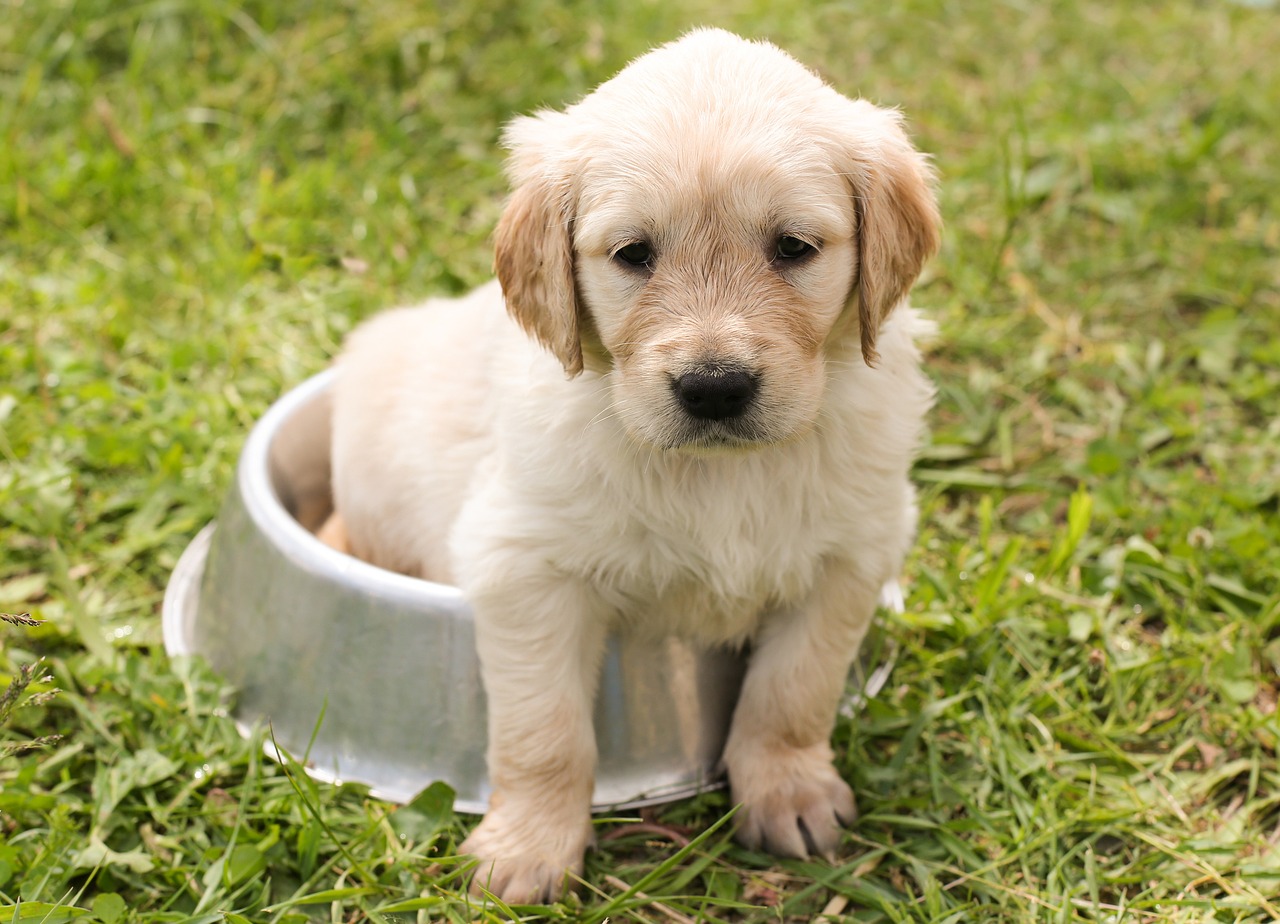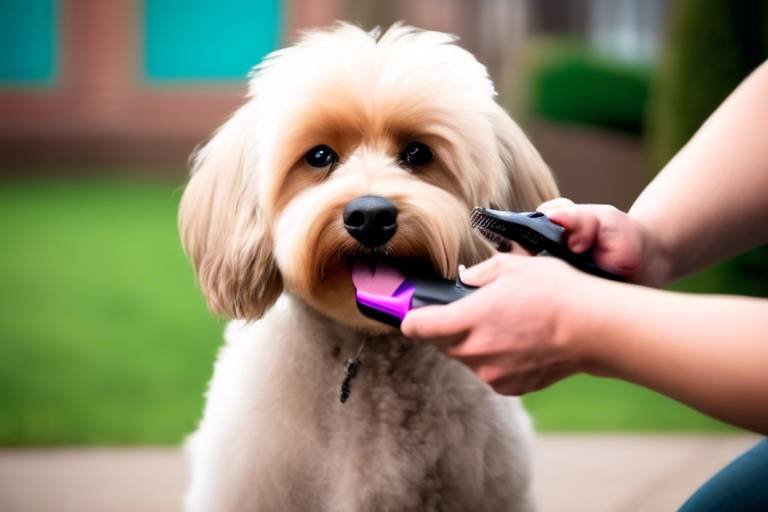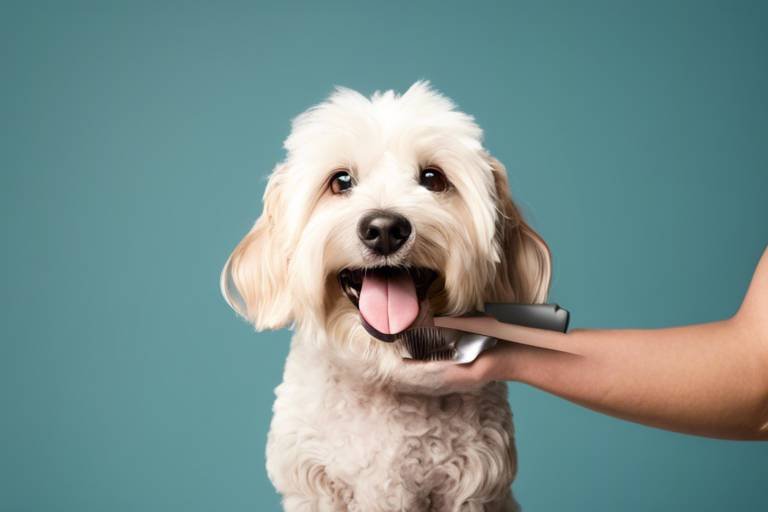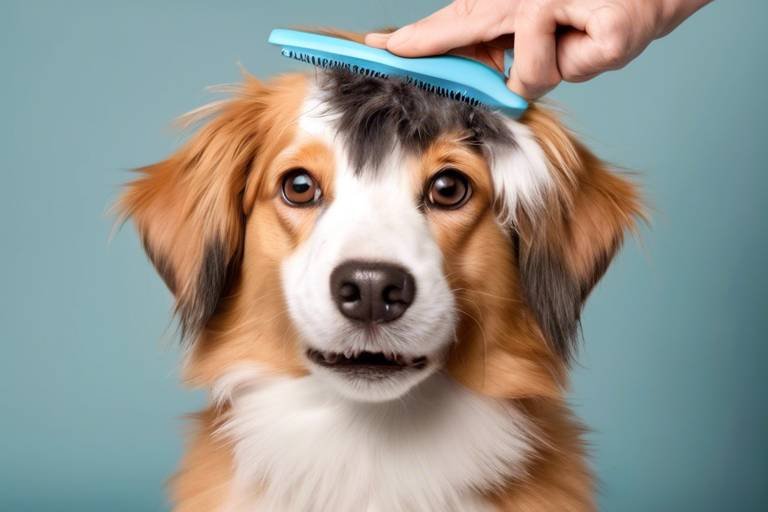Tips for Grooming Dogs with Sensitive Ears
Grooming your dog can be a delightful experience, but for those furry friends with sensitive ears, it can also be a source of anxiety and discomfort. Understanding how to approach grooming with care is essential for both you and your pet. Imagine trying to clean a delicate flower; you wouldn't want to be too rough, right? The same goes for your dog's ears! This article provides essential tips and techniques for grooming dogs with sensitive ears, ensuring their comfort and health during the grooming process.
First things first, let’s dive into what makes a dog's ears sensitive. The anatomy of a dog's ear is quite intricate, featuring a long ear canal that can trap moisture and debris. This can lead to a variety of issues, such as infections and allergies. Dogs with floppy ears, like Cocker Spaniels, are particularly prone to these problems because their ears trap heat and moisture, creating a perfect breeding ground for bacteria and yeast. Knowing your dog's specific ear anatomy can help you tailor your grooming techniques to keep their ears healthy and happy.
When it comes to grooming dogs with sensitive ears, the right tools can make all the difference. You wouldn't use a sledgehammer to hang a picture, would you? Similarly, selecting gentle grooming tools is crucial. Look for ear cleaners that are specifically designed for sensitive ears, as they are formulated to minimize discomfort while effectively cleaning. Soft cotton balls, gentle wipes, and even some specially designed ear syringes can help you maintain your dog's ear health without causing pain.
There are numerous ear cleaning solutions available, but choosing the right one is key. Here’s a quick overview:
| Type | Description | Best For |
|---|---|---|
| Natural Remedies | Gentle solutions like apple cider vinegar and coconut oil. | Dogs with mild irritations. |
| Commercial Products | Vet-recommended ear cleaners with specific ingredients. | Regular cleaning and maintenance. |
Natural remedies can be a fantastic option for cleaning sensitive ears. For instance, apple cider vinegar diluted with water can help balance the pH levels in your dog's ears, making it less hospitable for bacteria. Similarly, coconut oil has natural antifungal properties and can soothe irritated skin. Just be sure to consult your vet before trying any new treatments to ensure they are safe for your specific dog.
On the other hand, commercial products are often formulated with specific ingredients designed to target ear issues. Look for products that are alcohol-free and contain soothing agents. Always read the label and consult your veterinarian to find the best option for your dog's needs.
Now that you have the right tools, let’s talk about grooming techniques. Start by gently wiping the outer ear with a soft cloth or cotton ball soaked in your chosen cleaner. Avoid inserting anything deep into the ear canal, as this can cause injury. Instead, focus on the outer areas where dirt and wax accumulate. Remember, patience is key! If your dog seems anxious, take breaks and reward them with treats to create a positive association with grooming.
Being vigilant about your dog’s ear health is crucial. Look out for signs that your dog may have ear problems. Symptoms like excessive scratching, shaking their head frequently, or unusual odors can indicate an issue that needs attention. If you notice any of these signs, it’s essential to address them promptly to avoid discomfort during grooming.
Common symptoms of ear infections or irritations include:
- Scratching at the ears or surrounding areas.
- Head shaking or tilting.
- Foul odors emanating from the ears.
- Redness or swelling in the ear canal.
If you observe any of the symptoms mentioned above, it’s crucial to consult your vet. Early intervention can prevent more serious issues down the line. Just like you wouldn’t ignore a persistent headache, don’t overlook your dog’s discomfort—it’s always better to be safe than sorry!
Regular maintenance is key to keeping your dog's ears healthy between grooming sessions. Conducting regular ear checks at home allows you to catch any problems early, ensuring your dog stays comfortable. Make it a routine to check your dog’s ears at least once a week, looking for any signs of dirt or irritation.
During these checks, gently lift the ear flap and look inside. If you see any redness, swelling, or excessive wax buildup, it might be time for a cleaning. Regular checks can help you stay ahead of potential issues, making grooming a more pleasant experience for both you and your dog.
To minimize the risk of ear infections, consider these preventive care tips:
- Keep your dog's ears dry, especially after baths or swimming.
- Use a gentle ear cleaner regularly.
- Consult your vet for allergies that may affect ear health.
Q: How often should I clean my dog's ears?
A: It depends on the breed and their specific needs, but generally, once a month is a good rule of thumb. Some dogs may require more frequent cleanings.
Q: Can I use human ear cleaners on my dog?
A: No, human ear cleaners can be too harsh for dogs. Always use products specifically designed for canine use.
Q: What should I do if my dog resists ear cleaning?
A: Take it slow! Use treats and positive reinforcement to make the experience more enjoyable. If they continue to resist, consult your vet for advice.

Understanding Sensitive Ears
Every dog owner knows that grooming is a vital part of pet care, but when it comes to dogs with sensitive ears, the process requires a bit more finesse and understanding. Sensitive ears can be a common issue among various breeds, and they often come with their own set of challenges. To truly grasp the importance of proper ear care, it’s essential to understand the anatomy of a dog’s ear and the potential problems that can arise.
The canine ear is a complex structure composed of three main parts: the outer ear, the middle ear, and the inner ear. Each part plays a crucial role in hearing and overall health. Dogs with floppy ears, such as Cocker Spaniels or Basset Hounds, are particularly prone to ear problems due to reduced airflow, which can create a warm, moist environment that is perfect for bacteria and yeast to thrive. This can lead to infections that cause discomfort and pain, making grooming a stressful experience for both the dog and the owner.
Additionally, allergies—whether to food, pollen, or other environmental factors—can contribute to ear sensitivity. When a dog experiences an allergic reaction, it often results in inflammation and irritation in the ears, leading to excessive scratching or shaking of the head. This not only makes grooming difficult but can also exacerbate any existing issues. As a responsible dog owner, it’s crucial to be vigilant and recognize the signs of ear discomfort early on.
Common issues associated with sensitive ears include:
- Ear Infections: These can be caused by bacteria, yeast, or even parasites like ear mites.
- Allergic Reactions: Allergies can lead to inflammation and discomfort, prompting dogs to scratch or shake their heads excessively.
- Wax Buildup: Some dogs may produce excess wax, which can trap moisture and lead to infections.
Understanding these potential problems is the first step in ensuring your dog’s ear health. Regular grooming and checks can help prevent many of these issues from escalating. In the next sections, we will explore how to choose the right tools and techniques for grooming dogs with sensitive ears, ensuring a comfortable experience for your furry friend.
Q: How often should I check my dog's ears?
A: It's recommended to check your dog's ears at least once a week for any signs of redness, odor, or excessive wax buildup.
Q: Can I use human ear cleaners on my dog?
A: No, human ear cleaners can be too harsh for a dog's sensitive ears. Always opt for products specifically designed for canine use.
Q: What should I do if I notice a foul smell coming from my dog's ears?
A: A foul odor may indicate an infection. It's best to consult your veterinarian for a proper diagnosis and treatment.

Choosing the Right Tools
When it comes to grooming dogs with sensitive ears, choosing the right tools is absolutely crucial. You wouldn’t want to use a sledgehammer to crack a nut, right? It’s all about finding the gentle yet effective tools that will keep your furry friend comfortable while ensuring their ears are clean and healthy. A well-equipped grooming kit can make all the difference, transforming a potentially stressful experience into a pleasant bonding moment.
First and foremost, consider the ear cleaner. Look for products that are specifically designed for dogs, particularly those with sensitive ears. Natural solutions, such as those containing aloe vera or witch hazel, can be soothing and effective. Avoid anything with harsh chemicals that could irritate your dog's delicate skin. You might also want to try a few different products to see which one your dog responds to best, as every pup is unique.
Next up, let’s talk about ear wipes. These are fantastic for quick clean-ups and can be especially handy if your dog is prone to ear wax buildup. Choose wipes that are alcohol-free and hypoallergenic to prevent any potential irritation. They should be soft enough to avoid scratching the insides of your dog’s ears. Always remember, the goal is to be gentle, so if your dog seems uncomfortable, it’s time to reevaluate your approach.
Another essential tool is a pair of ear scissors. If your dog has long hair around their ears, keeping that hair trimmed can help reduce the risk of infections. Look for rounded-tip scissors to avoid any accidental pokes. It’s crucial to trim carefully, as you don’t want to cause any distress. Think of it like giving your dog a haircut; it requires patience and a steady hand.
Additionally, a good ear thermometer can be a game-changer. Keeping an eye on your dog's ear temperature can help you catch potential infections before they escalate. A normal ear temperature for dogs is between 101°F and 102.5°F. If you notice any significant changes, it might be time to consult your vet.
In summary, here’s a quick overview of the essential tools you’ll need:
| Tool | Description | Why It’s Important |
|---|---|---|
| Ear Cleaner | Gentle, dog-specific cleaning solution | Prevents infections and maintains hygiene |
| Ear Wipes | Soft, hypoallergenic wipes | Quick clean-ups without irritation |
| Ear Scissors | Rounded-tip scissors for trimming | Reduces hair around ears to prevent infections |
| Ear Thermometer | Device for checking ear temperature | Helps monitor ear health and detect infections early |
By equipping yourself with these tools, you’ll be well on your way to ensuring a smooth and stress-free grooming experience for your dog. Remember, grooming isn’t just about cleanliness; it’s also about building trust and comfort. So take your time, be gentle, and watch your pup thrive!
Types of Ear Cleaners
When it comes to grooming dogs with sensitive ears, choosing the right ear cleaner is crucial for their comfort and health. There are several types of ear cleaners available, each designed to address specific needs. Understanding these options can help you make an informed decision that will keep your furry friend happy and healthy.
First, let's break down the types of ear cleaners into two main categories: natural remedies and commercial products. Each category has its own benefits and drawbacks, so let's explore them in detail.
Natural remedies can be a great option for cleaning your dog's ears. They often contain gentle ingredients that are less likely to irritate sensitive skin. For example, apple cider vinegar is known for its antibacterial properties and can help maintain a healthy pH balance in the ear canal. You can mix equal parts of apple cider vinegar and water to create a homemade ear cleaner. Just remember to use it sparingly and avoid applying it if your dog has any open wounds or severe irritation.
Another popular natural remedy is coconut oil. Not only does it moisturize the ear canal, but it also has antifungal properties that can help prevent infections. Applying a few drops of lukewarm coconut oil can soothe your dog's ears while keeping them clean. However, be cautious and ensure that your dog isn’t allergic to coconut before using it.
On the other hand, if you prefer a more straightforward approach, there are numerous commercial ear cleaning products available. These products are specifically formulated to tackle ear wax buildup, dirt, and moisture that can lead to infections. When choosing a commercial ear cleaner, look for products that are vet-recommended and free from harsh chemicals. It's essential to read the ingredient list and avoid anything with alcohol, as it can cause discomfort to sensitive ears.
Here’s a quick comparison of some popular commercial ear cleaners:
| Product Name | Main Ingredients | Best For |
|---|---|---|
| Vet's Best Ear Relief Wash | Aloe, Witch Hazel | Cleaning and soothing |
| PetMD Ear Cleaner | Salicylic Acid, Aloe Vera | Preventing infections |
| Zymox Ear Cleanser | Enzymes | Cleaning and infection control |
When selecting a product, consider your dog's specific needs. For instance, if your dog is prone to ear infections, a cleaner with antifungal properties might be the best choice. Always consult your veterinarian if you are unsure which product is appropriate for your dog.
In conclusion, whether you opt for natural remedies or commercial products, the key is to ensure that the ear cleaner you choose is gentle and effective. Regular ear cleaning can prevent many common ear issues, making grooming a more pleasant experience for both you and your dog.
Q: How often should I clean my dog's ears?
A: It depends on your dog's breed and ear type. Generally, once a month is sufficient, but dogs prone to ear infections may require more frequent cleaning.
Q: Can I use human ear cleaners on my dog?
A: No, human ear cleaners can contain ingredients that are harmful to dogs. Always use products specifically designed for canine use.
Q: What should I do if my dog resists ear cleaning?
A: Be patient and try to make the experience as positive as possible. Use treats and gentle handling to help your dog feel more comfortable.
Natural Remedies
When it comes to grooming dogs with sensitive ears, natural remedies can be a game-changer. These options are not only gentle but also effective in maintaining ear health without the harsh chemicals often found in commercial products. One of the most popular natural remedies is apple cider vinegar. This magical elixir is known for its antibacterial and antifungal properties, making it an excellent choice for cleaning your dog's ears. To use it, simply mix equal parts of apple cider vinegar and water, and apply a few drops to your dog's ear. Gently massage the base of the ear to allow the solution to work its magic, then wipe away any excess with a soft cloth. Just like a refreshing drink, your dog will appreciate the soothing sensation!
Another fantastic option is coconut oil, which is renowned for its moisturizing properties. Not only does it help to soothe irritated skin, but it also creates a barrier that can protect against infections. To use coconut oil, warm a small amount in your hands until it’s liquid, then apply a few drops into the ear canal. Massage gently, allowing the oil to coat the inner ear. This method not only cleans but also nourishes the skin, providing a spa-like experience for your furry friend.
It's important to remember that while natural remedies are generally safe, they should be used with caution. Always conduct a patch test before applying any new substance to ensure your dog doesn’t have an allergic reaction. Additionally, if your dog has a history of ear problems, it’s wise to consult your veterinarian before trying any new treatment. After all, we want to ensure your canine companion remains comfortable and happy!
Here’s a quick reference table summarizing these natural remedies:
| Natural Remedy | Benefits | Application Method |
|---|---|---|
| Apple Cider Vinegar | Antibacterial, antifungal | Mix with water, apply drops, massage, and wipe |
| Coconut Oil | Moisturizing, protective | Warm and apply drops, massage into ear |
Incorporating these natural remedies into your dog’s grooming routine can help maintain their ear health while offering a soothing experience. Just remember to keep an eye on their ears and consult your vet if you notice any persistent issues. With a little care and attention, your dog can enjoy clean, healthy ears without the stress of harsh chemicals!
Commercial Products
When it comes to grooming dogs with sensitive ears, choosing the right commercial ear cleaning products can make all the difference. Not all products are created equal, and some may contain harsh chemicals that could irritate your dog's delicate ear tissue. Therefore, it’s essential to look for products specifically formulated for sensitive ears. These products often include soothing ingredients that help maintain ear health without causing discomfort.
Many reputable brands offer ear cleaners that are gentle yet effective. When selecting a product, consider the following key factors:
- Ingredients: Look for natural ingredients such as aloe vera, chamomile, or witch hazel, which can help soothe and clean without irritation.
- pH Balance: Ensure the product is pH-balanced for dogs to avoid disrupting the natural balance of their ear canal.
- Alcohol-Free: Alcohol can be very drying and irritating, so opt for alcohol-free formulas.
Here are some popular commercial ear cleaning products that are highly recommended by veterinarians:
| Product Name | Key Features | Recommended For |
|---|---|---|
| Vet’s Best Ear Relief Wash | Contains natural ingredients like aloe and witch hazel | Dogs with sensitive ears and minor irritations |
| Pet MD Ear Cleaner | pH-balanced, alcohol-free formula | Routine ear cleaning for all breeds |
| Zymox Ear Solution | Enzymatic formula for infections and irritations | Dogs with ear infections or chronic issues |
Before using any commercial product, it’s wise to consult with your veterinarian, especially if your dog has a history of ear problems. They can recommend the best products tailored to your dog's specific needs. Always follow the instructions on the label to ensure safe and effective use. Regular use of the right ear cleaning product can help keep your dog's ears clean, healthy, and free from discomfort.
Q: How often should I clean my dog's ears?
A: It generally depends on your dog's breed and ear type. Dogs with floppy ears may need more frequent cleaning, while others might only require it monthly. Always consult your vet for personalized advice.
Q: Can I use human ear cleaners on my dog?
A: No, human ear cleaners can contain ingredients that are harmful to dogs. Always use products specifically designed for canine use.
Q: What should I do if my dog resists ear cleaning?
A: Gradually introduce the process by rewarding your dog with treats and praise. If they continue to resist, consider seeking professional help from a groomer or veterinarian.
Grooming Techniques
Grooming a dog with sensitive ears can be a bit of a challenge, but with the right techniques, it can be a smooth and enjoyable experience for both you and your furry friend. First and foremost, it’s essential to create a calm environment. Imagine trying to get a haircut in a noisy, chaotic salon—stressful, right? The same goes for your dog. Choose a quiet area, free from distractions, where your dog feels safe and comfortable. Soft music can also help soothe their nerves.
Before you even start grooming, make sure your dog is relaxed. You can do this by gently petting them and speaking in a soft, reassuring voice. This helps build trust and makes them more receptive to the grooming process. Once your dog is calm, it’s time to assess their ears. Look for any signs of redness, swelling, or discharge. If you notice anything unusual, it’s best to consult your vet before proceeding.
When it comes to the actual grooming, you’ll want to use gentle motions. Start by using a soft, damp cloth or a cotton ball to gently wipe the outer ear. Avoid inserting anything deep into the ear canal, as this can cause discomfort or even injury. Think of it like cleaning your own ears; you wouldn’t want to poke too deep, right? If you’re using an ear cleaner, apply a few drops into the ear and gently massage the base of the ear to help loosen any debris. Allow your dog to shake their head to remove excess cleaner—this is completely normal!
After cleaning, it’s important to dry the ears properly. Moisture can lead to infections, especially in sensitive ears. Use a clean, dry cotton ball to gently dab the inner ear and remove any leftover moisture. This simple step can make a huge difference in maintaining ear health. If your dog has long hair around their ears, consider trimming it to allow for better air circulation. Just be cautious and use blunt-tipped scissors to avoid accidental cuts.
Finally, incorporate grooming into your dog’s regular routine. This not only helps keep their ears clean but also makes them accustomed to the process. Think of it as a bonding time where you both can relax and enjoy each other’s company. You can even reward your dog with treats after a successful grooming session to create a positive association. Remember, patience is key! If your dog seems anxious, take breaks and reassure them. With time and practice, you’ll both become pros at ear grooming!
- How often should I clean my dog's ears?
It generally depends on the breed and their ear condition. For dogs with floppy ears or those prone to ear infections, a weekly check and cleaning are advisable. Others may only need it monthly. - Can I use human ear cleaners on my dog?
No, it’s best to use products specifically formulated for dogs, as human products may contain ingredients that can irritate their ears. - What if my dog resists ear cleaning?
Start slowly and make it a positive experience. Use treats and praise to encourage them. If they continue to resist, consult your vet for advice.

Signs of Ear Problems
As a dog owner, it's essential to be vigilant about your furry friend's ear health. Dogs, like humans, can experience a variety of ear issues that can lead to discomfort and even serious health problems if left untreated. So, how do you know when your dog's ears are in trouble? There are several that can help you identify potential issues early on.
One of the most common indicators that something might be wrong is when your dog starts to scratch at their ears frequently. This scratching can be a result of irritation, infection, or allergies. If you notice your dog shaking their head more than usual, it could be a sign that they are trying to relieve discomfort caused by an ear issue. Additionally, keep an eye out for any unusual odors coming from their ears, as this can often indicate an infection that requires veterinary attention.
Another critical sign to watch for is the presence of redness or swelling in the ear canal. If your dog's ears appear inflamed or are producing discharge, it's crucial to take action. Discharge can vary from being clear to a more serious, foul-smelling substance, indicating an infection. In some cases, you might also notice your dog becoming unusually sensitive about having their ears touched, which can be a clear signal that they are experiencing pain.
To help you better understand these signs, here’s a quick breakdown of symptoms to watch for:
- Scratching or rubbing ears: Indicates irritation or discomfort.
- Head shaking: A common reaction to ear discomfort.
- Unusual odors: A potential sign of infection.
- Redness or swelling: Visible signs of inflammation.
- Discharge: Can vary in color and smell, indicating different types of infections.
- Excessive sensitivity: Reluctance to have ears handled can indicate pain.
Recognizing these signs early can significantly impact your dog's overall health and comfort. If you see any of these symptoms, it's crucial to consult with your veterinarian promptly. They can help diagnose the issue and provide the necessary treatment to ensure your dog remains happy and healthy.
Q: How often should I check my dog's ears?
A: It's a good idea to check your dog's ears at least once a week for signs of dirt, wax buildup, or irritation.
Q: What should I do if I notice a bad smell coming from my dog's ears?
A: A bad odor can indicate an infection. It's best to consult your veterinarian for an evaluation and treatment.
Q: Can I clean my dog's ears at home?
A: Yes, you can clean your dog's ears at home using vet-recommended products, but be cautious and gentle, especially if your dog has sensitive ears or any signs of infection.
Q: What are some preventive measures for ear problems?
A: Regular ear checks, keeping ears dry, and using appropriate ear cleaners can help prevent ear issues.
Symptoms to Watch For
When it comes to our furry friends, being vigilant about their health is paramount, especially for dogs with sensitive ears. These adorable companions can’t voice their discomfort, so it’s up to us to be observant. Some common symptoms indicate that your dog may be experiencing ear issues, and recognizing these signs early can save them from unnecessary pain and distress.
One of the most noticeable symptoms is scratching at the ears. If you see your dog persistently pawing at their ears or rubbing them against furniture, it could be a sign of irritation or infection. Additionally, watch for head shaking; this is often a dog's way of trying to relieve discomfort. If they’re shaking their head more than usual, it might be time to take a closer look.
Another symptom to keep an eye on is the presence of unusual odors emanating from the ears. A foul smell can often indicate an infection or buildup of wax and debris. If you notice a strong, unpleasant scent, it’s crucial to investigate further. Furthermore, be on the lookout for any discharge from the ears, which can range from a dark, waxy substance to a yellow or green discharge, signaling a potential infection.
In some cases, you might also observe swelling or redness around the ear area. This could be a sign of inflammation, and it’s essential to address it promptly. If your dog is exhibiting any of these symptoms, don’t hesitate to consult a veterinarian. Early intervention can not only alleviate your dog's discomfort but also prevent more serious health issues down the line.
To summarize, here are the key symptoms to watch for regarding your dog's ear health:
- Frequent scratching at the ears
- Excessive head shaking
- Unpleasant odors from the ears
- Discharge from the ear canal
- Swelling or redness around the ears
By keeping an eye out for these symptoms, you can ensure that your dog remains healthy and happy, enjoying life to the fullest without the discomfort of ear issues. Remember, your dog's well-being is in your hands, so stay observant and proactive!
Q: How often should I check my dog's ears?
A: It's best to check your dog's ears at least once a week. Regular checks can help you catch any potential issues early.
Q: What should I do if I notice discharge or a bad smell?
A: If you notice any discharge or unpleasant odors, it's important to consult your veterinarian as soon as possible to determine the cause and appropriate treatment.
Q: Can I clean my dog's ears at home?
A: Yes, you can clean your dog's ears at home, but it's essential to use the right products and techniques. Always consult your vet for recommendations tailored to your dog's specific needs.
Q: Are there any natural remedies for ear issues?
A: Some natural remedies, like apple cider vinegar and coconut oil, can be beneficial. However, it's advisable to consult your veterinarian before trying any home remedies.
When to Consult a Vet
Knowing when to consult a veterinarian regarding your dog's ear health is crucial for their overall well-being. Dogs can't voice their discomfort, so as a responsible pet owner, you must be vigilant and observant. If you notice your furry friend exhibiting any unusual behaviors, it’s time to take action. For example, if your dog is constantly scratching at their ears, shaking their head excessively, or if you detect a foul odor emanating from their ears, these could be signs of an underlying issue. Ignoring these symptoms can lead to more severe problems, such as infections or chronic discomfort.
Additionally, if you observe any discharge from your dog’s ears, especially if it’s dark or has a foul smell, you should consult a vet immediately. This could indicate an infection that needs prompt treatment. Remember, prevention is always better than cure. Regular ear checks can help you catch these issues early, but if something feels off, don’t hesitate to seek professional advice. Your vet can provide a thorough examination and may recommend treatments or medications tailored to your dog's specific needs.
Here are some specific scenarios when you should definitely make that call to the vet:
- If your dog shows signs of pain when you touch their ears.
- When there’s swelling or redness in the ear canal.
- If your dog is losing balance or has difficulty walking, which could indicate an inner ear issue.
- When home remedies or over-the-counter treatments aren’t improving the situation.
Additionally, if your dog is prone to ear infections or has a history of allergies, regular check-ups with your vet can help manage these conditions effectively. Your veterinarian can recommend a suitable cleaning routine and preventive measures to keep your dog's ears healthy. Remember, your dog's comfort and health should always be a priority, and staying proactive about their ear care can save you both from unnecessary stress down the line.
Q: How often should I check my dog's ears?
A: It's a good practice to check your dog's ears at least once a week. This helps you catch any potential issues early.
Q: Can I use human ear cleaners on my dog?
A: No, human ear cleaners can be too harsh for dogs. Always use products specifically designed for canine ear care.
Q: What can I do to prevent ear infections in my dog?
A: Keeping your dog's ears clean and dry, avoiding water accumulation during baths, and regular vet check-ups can help prevent infections.
Q: Are certain breeds more prone to ear problems?
A: Yes, breeds with floppy ears, such as Cocker Spaniels and Basset Hounds, are more susceptible to ear infections due to reduced airflow.

Maintaining Ear Health
Maintaining your dog's ear health is crucial to ensuring their overall well-being and comfort. Just like humans, dogs can suffer from various ear issues that can lead to discomfort and even serious health problems if left unchecked. Regular ear maintenance isn't just about cleaning; it's about developing a routine that keeps their ears healthy and irritation-free. Think of it as a regular check-up for their ears, akin to how we schedule our dental appointments. By being proactive, you can prevent many issues before they arise.
One of the best practices for maintaining ear health is to conduct regular checks. This means taking a few minutes each week to inspect your dog's ears for any signs of redness, swelling, or unusual odors. Dogs with floppy ears, like Basset Hounds or Cocker Spaniels, may be more prone to ear problems due to reduced airflow. Therefore, it’s essential to be vigilant. If you notice anything amiss, don’t hesitate to consult your veterinarian. Regular checks can help you catch potential problems early, allowing for prompt treatment and minimizing discomfort for your furry friend.
In addition to regular checks, implementing preventive care tips can significantly reduce the likelihood of ear infections. Here are some effective strategies:
- Keep Ears Dry: Moisture can lead to bacterial growth, so always dry your dog's ears after baths or swimming.
- Avoid Irritants: Be cautious with products that may irritate your dog's ears, including certain shampoos and cleaning solutions.
- Regular Grooming: Maintain a grooming routine that includes cleaning the outer ear and ensuring there’s no excessive hair blocking the ear canal.
- Healthy Diet: A balanced diet can improve your dog's immune system, making them less susceptible to infections.
Remember, your dog's ears are sensitive, and even minor irritations can escalate quickly. By keeping an eye on their ear health and following these preventive measures, you can help ensure that your dog remains happy and healthy. Just like you wouldn’t ignore a toothache, don’t overlook your dog's ear discomfort—after all, a happy dog equals a happy owner!
Q: How often should I clean my dog's ears?
A: It depends on the breed and individual needs, but generally, a thorough cleaning every 2-4 weeks is sufficient for most dogs.
Q: What are the signs that my dog might have an ear infection?
A: Look for symptoms such as frequent scratching at the ears, shaking their head, unusual smells, or redness inside the ear.
Q: Can I use human ear cleaners on my dog?
A: No, human ear cleaners can be too harsh and may contain ingredients that are harmful to dogs. Always use products specifically designed for canine use.
Q: What should I do if I notice something unusual in my dog's ears?
A: If you see any signs of irritation, redness, or discharge, consult your veterinarian promptly to prevent more serious issues.
Regular Ear Checks
Maintaining your dog's ear health is crucial, especially for those with sensitive ears. Regular ear checks can be a game-changer, helping you catch potential issues before they escalate into something more serious. Just like we might check our own ears for discomfort or wax buildup, our furry friends need the same attention. But what exactly should you be looking for during these checks? Well, it's not just about peeking inside; it's about understanding what a healthy ear looks like and recognizing any changes that could indicate a problem.
First, find a comfortable spot for both you and your dog. This could be on the floor, a couch, or even a grooming table—wherever your pup feels at ease. Start by gently lifting the ear flap to examine the ear canal. A healthy ear should appear clean and free of debris, with a light pink color. If you notice any redness, swelling, or discharge, these could be signs of an infection or irritation that requires further attention.
It's also essential to observe your dog's behavior during these checks. If your dog flinches, shakes their head, or seems unusually sensitive when you touch their ears, it might indicate discomfort. In such cases, don't hesitate to consult your veterinarian. Remember, prevention is always better than cure. By establishing a routine for ear checks, you can help ensure your dog's ears remain healthy and irritation-free. Here’s a quick checklist to guide you through the process:
- Check for dirt or wax buildup.
- Look for any signs of redness or swelling.
- Smell the ear; any foul odor could indicate an infection.
- Observe your dog's behavior when touching their ears.
In addition to these checks, consider incorporating ear cleaning into your grooming routine, especially if your dog is prone to ear issues. Use a gentle ear cleaner recommended by your vet, and always follow the instructions carefully. Remember, your dog's comfort is paramount. Make the experience as positive as possible by offering treats and praise, turning what could be a stressful situation into a bonding moment.
Ultimately, regular ear checks are about being proactive. By keeping an eye on your dog's ear health, you can catch potential problems early and maintain their overall well-being. So, the next time you cuddle up with your furry friend, take a moment to check their ears—it could save them from unnecessary discomfort down the line!
- How often should I check my dog's ears? It's recommended to check your dog's ears at least once a week, especially if they are prone to ear problems.
- What are the signs of an ear infection? Common signs include redness, swelling, discharge, foul odor, and your dog frequently scratching or shaking their head.
- Can I use human ear cleaners on my dog? No, it's best to use products specifically formulated for dogs, as human products can be too harsh and may cause irritation.
- When should I consult a veterinarian? If you notice any unusual symptoms during your checks or if your dog seems to be in pain, it's crucial to seek veterinary advice promptly.
Preventive Care Tips
Maintaining your dog's ear health is crucial, especially for those with sensitive ears. Just like we take care of our own ears, our furry friends deserve the same level of attention and care. One of the best ways to ensure their ears stay healthy is through preventive measures. Regular checks and a proactive approach can help you catch potential issues before they escalate. So, what can you do to keep those floppy ears in tip-top shape?
First and foremost, it's essential to establish a routine for checking your dog's ears. Aim to inspect their ears at least once a week. During these checks, look for any signs of redness, swelling, or discharge. If you notice any unusual changes, it might be time to consult your vet. Additionally, keeping the ear canal clean is vital. While you don't want to over-clean, a gentle wipe with a soft cloth can help remove excess wax or debris. This simple act can prevent the buildup that might lead to infections.
Another tip is to ensure that your dog’s ears stay dry, especially after baths or swimming. Moisture can create a perfect breeding ground for bacteria and yeast, which can lead to infections. To help with this, consider using a cotton ball to gently absorb any excess moisture after bathing. Just remember to never insert anything deep into the ear canal, as this can cause injury.
Moreover, diet plays a significant role in ear health. Feeding your dog a balanced diet rich in omega fatty acids can help maintain skin and ear health. Foods that are high in these nutrients can reduce inflammation and promote overall well-being. If you're unsure about your dog's diet, consulting with your vet can provide tailored advice that suits your dog's specific needs.
Lastly, regular grooming sessions can also aid in ear health. While grooming, take the time to check your dog's ears and clean them as necessary. This not only helps with cleanliness but also strengthens the bond between you and your furry companion. Remember, a little bit of love and attention goes a long way in preventing ear issues!
- How often should I clean my dog's ears? Ideally, you should check and clean your dog's ears once a week, but this can vary based on your dog's breed and ear type.
- What signs indicate my dog might have an ear infection? Look for symptoms like excessive scratching, shaking their head, foul odor, or redness inside the ear.
- Can I use human ear cleaners on my dog? No, it’s best to use products specifically formulated for dogs, as human products can be too harsh.
- What natural remedies can help with ear cleaning? Apple cider vinegar diluted with water and coconut oil are popular natural options that can be safe for cleaning your dog's ears.
Frequently Asked Questions
- What are the signs that my dog has sensitive ears?
Dogs with sensitive ears may show signs such as frequent scratching, shaking their head, or a strong odor coming from their ears. If you notice any redness, swelling, or discharge, it’s essential to consult your vet as these could be indicators of an infection or irritation.
- How often should I clean my dog's ears?
It’s generally recommended to check your dog's ears weekly and clean them as needed. For dogs prone to ear issues, you might want to clean them every couple of weeks. However, always consult your veterinarian for the best schedule tailored to your dog's specific needs.
- What tools are best for grooming dogs with sensitive ears?
When grooming dogs with sensitive ears, opt for gentle tools such as soft cotton balls or pads and vet-approved ear cleaners. Avoid using anything sharp or abrasive that could cause discomfort or injury to your dog’s delicate ear structures.
- Are natural remedies effective for cleaning my dog’s ears?
Yes, natural remedies like apple cider vinegar and coconut oil can be effective for cleaning your dog's ears. They have antibacterial properties and can help soothe irritation. However, always dilute vinegar with water and consult your vet before using any remedy to ensure it’s safe for your dog.
- When should I take my dog to the vet for ear issues?
If you notice persistent scratching, foul odor, swelling, or if your dog seems to be in pain when you touch their ears, it’s time to consult a vet. Early intervention can prevent more serious issues and ensure your dog’s comfort and health.
- Can I use human ear cleaners on my dog?
No, it’s not advisable to use human ear cleaners on dogs. Their ear chemistry is different, and human products can cause irritation or allergic reactions. Always use products specifically formulated for canine ear care.
- What preventive care can I provide for my dog's ear health?
To maintain your dog's ear health, regularly check their ears for dirt and debris, keep their ears dry after baths, and ensure they are not exposed to excessive moisture. Additionally, maintaining a clean environment and a healthy diet can also contribute to overall ear health.



















